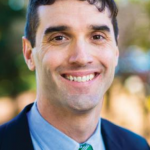Dental health critical at an early age
By Rob Oldham
It’s a common misconception that baby teeth don’t matter much — after all, they’re just going to fall out anyway, right?
But the science is firm: Baby teeth are not expendable, and they have many more roles beyond “holding space” for permanent teeth.

Rob Oldham
Proper care of your child’s baby teeth can help their self-esteem, aid in speech development and promote good nutrition because they’ll be able to chew properly. Tooth decay in infants and toddlers can have a terrible impact on them later in life. Pain and infection can interrupt learning, playing and growing.
It’s also great to model proper oral health practices for kids starting at an early age.
I know, I know — brushing your child’s teeth sounds about as fun as getting your own teeth drilled. But there are some tricks that can help. With babies, you can lay them in your lap with their head facing you. Or, try the two-parent, knee-to-knee configuration. With toddlers, model how fun it is to brush your teeth with games or songs. Usually you’ll need to help children brush until age 7 or 8 as they don’t have the dexterity to reach all of their teeth and do a thorough job.
Many parents aren’t aware that you can begin flossing children’s teeth as soon as teeth begin to touch. There are fun, child-friendly “flossers” available in most stores that are easier to use with young children than regular floss.
My youngest, Odette, is 15 months old and loves to brush her teeth. She’ll walk around the house showing off her toothbrush. But she’s a rarity — my other kids weren’t nearly as receptive. It can be a challenge, but it’s important. We established a “bottle, book, brush, bed” routine with our kids, as it’s important that they brush after having a bottle. Once those habits are cemented in, it becomes a lot easier.
Another thing I get a lot of questions about is fluoride. It’s been the subject of debate over the years, but we now recommend it in appropriate quantities for young children. In fact, as soon as your child’s first teeth come in, a dentist can apply a varnish to protect them. Don’t overdo the fluoride, though. Keep an eye on toddlers if they’re brushing their own teeth to make sure they only use a pea-sized amount of toothpaste, but that they’re brushing thoroughly.
Even before children grow teeth, though, it’s good practice to rub their gums with a washcloth to keep bacteria from building up. And don’t share items with your children that have been in or touched your mouth, such as cups, utensils and toothbrushes, since cavity-producing bacteria can be transferred this way.
Many people are surprised to learn that we now recommend children have their first dental appointment when they get their first tooth, or at their first birthday — whichever comes first. There are even dentists who specialize in pediatric care, if your child is fussy.
When it all comes down to it, just remember: It’s never too early.
Rob Oldham is Placer County’s public health officer.